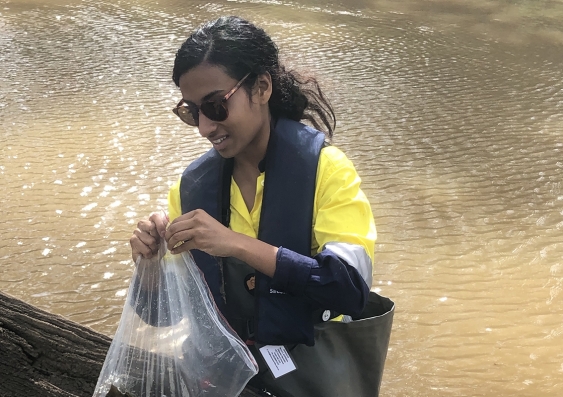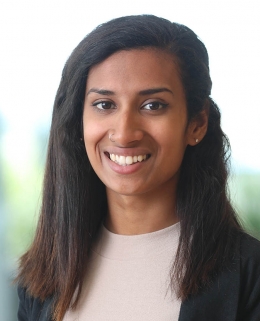Marine Biology alumna casts her net wide for career success
Young environmental scientist Tashya Miranda is applying her marine biology skills and knowledge to improving Sydney's water.
Young environmental scientist Tashya Miranda is applying her marine biology skills and knowledge to improving Sydney's water.

You will equally find Tashya Miranda in her element communicating the beauty of microscopic bugs, participating in a team hack of solutions for Sydney’s water future, or wading in a Sydney stream collecting water samples.
Ms Miranda graduated from the UNSW Bachelor of Environment Science with Honours in Marine Biology. For her honours she worked on a project exploring the changing range of the Great Barrier Reef’s tropical fish as they migrated further south due to warming waters caused by climate change.
She says you emerge from completing honours projects with strong skills and experience ready for a variety of career paths in the outside world.
“I think honours projects prepare you as a great all-rounder, especially in terms of communications skills. You often have to communicate your thousands-of-words thesis to someone who doesn't understand what you are working on and get your message across simply.
“That communication skill is so important because sometimes science isn't easy to understand and it means I can communicate the facts clearly and effectively when working out in the community.”
Ms Miranda was one of 11 graduates chosen from 1300 applicants for a graduate placement job at Sydney Water, Australia’s largest water utility.
Two of the key features that attracted her to a graduate program role were the emphasis on skills development and the meaningfulness of the role in contributing to the liveability and quality of life for people across the greater Sydney region.

Tashya Miranda.
“The graduate program allows you to rotate every 12 months to a different part of the business depending on your interest and the skills you’d like to develop further or specialise in.
“My first placement was in the Science Research and Innovation team, working with a group of principal scientists on projects such as trialling new technologies to detect pressure changes in Sydney’s water mains, understanding the emergence of environmental contaminants, and improving the health of our waterways. I have also recently published a technical paper from one of the many projects I worked on.
“That was a really good opportunity. Now I'm in my second placement and gaining more operational experience, out in the field sampling, analysing water quality data and gaining experience with Sydney Water’s Aquatic Ecology group. ”
Ms Miranda says the seeds of success were sown in the strong foundations of her Bachelor of Science degree and her application of this learning has steadily grown.
“I remember being on microscopes during zoology and trying to learn all this taxonomy of bugs and I thought, ‘well, I don't think I'm ever going to use this’, even though I enjoyed it.
“But understanding the dynamics of macroinvertebrates in waterways is so important to really understand the water quality and stream health of our rivers.
“Having studied stable isotope analysis in my honours research, I was able to apply my knowledge to waterway health projects in my first placement, which was an enormous benefit.
“As part of my role I get to analyse environmental data, make meaningful interpretations and report on those outcomes. My degree really set me up to do these things and really enjoy the work.”
Ms Miranda has the ambition to follow in the tweet stream of Dean of Science Emma Johnston, consciously sharing her science knowledge with the broader community.
“I’m inspired by the way Emma is not just awarded for her science but the way she communicates it.
“No matter where I go in my career, I think it will always have an element of science communication in it. I already have a passion for science, now I'm striving to continually develop my communication skills and be an effective speaker and writer.
“I regularly participate with other early-career professionals in hack-a-thons where we have four hours to come up with innovative solutions for some of the big challenges facing Sydney.
“It’s been really invigorating to pitch ideas to tackle topics like Sydney’s current drought, and ways we can re-use our waste resources. I was recently part of a program called Smart Seeds, where I collaborated across the industry and worked with young professionals from places like Lendlease and Transport for NSW to develop a safe solution for flood-prone communities in Western Sydney.
“I always put my hand up for these opportunities because practising pitching and being excited about your solution is what good communication is all about.”